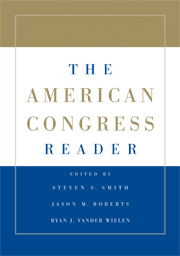Book contents
- Frontmatter
- Contents
- THE AMERICAN CONGRESS READER
- PART I THE AMERICAN CONGRESS: MODERN TRENDS
- PART II REPRESENTATION AND LAWMAKING IN CONGRESS: THE CONSTITUTIONAL AND HISTORICAL CONTEXT
- PART III CONGRESSIONAL ELECTIONS AND POLICY ALIGNMENTS
- PART IV MEMBERS, GOALS, RESOURCES, AND STRATEGIES
- PART V PARTIES AND LEADERS
- PART VI THE STANDING COMMITTEES
- PART VII THE RULES OF THE LEGISLATIVE GAME
- 20 Sample of a Special Rule
- 21 Sample of a Unanimous Consent Agreement
- 22 On the Effects of Legislative Rules
- 23 The Partisan Basis of Procedural Choice
- 24 The Evolution of Agenda-Setting Institutions in Congress
- PART VIII THE FLOOR AND VOTING
- PART IX CONGRESS AND THE PRESIDENT
- PART X CONGRESS AND THE COURTS
- PART XI CONGRESS, LOBBYISTS, AND INTEREST GROUPS
- PART XII CONGRESS AND BUDGET POLITICS
- PART XIII FURTHER READINGS ON CONGRESSIONAL POLITICS
- References
23 - The Partisan Basis of Procedural Choice
Allocating Parliamentary Rights in the House, 1789–1990
Published online by Cambridge University Press: 05 June 2012
- Frontmatter
- Contents
- THE AMERICAN CONGRESS READER
- PART I THE AMERICAN CONGRESS: MODERN TRENDS
- PART II REPRESENTATION AND LAWMAKING IN CONGRESS: THE CONSTITUTIONAL AND HISTORICAL CONTEXT
- PART III CONGRESSIONAL ELECTIONS AND POLICY ALIGNMENTS
- PART IV MEMBERS, GOALS, RESOURCES, AND STRATEGIES
- PART V PARTIES AND LEADERS
- PART VI THE STANDING COMMITTEES
- PART VII THE RULES OF THE LEGISLATIVE GAME
- 20 Sample of a Special Rule
- 21 Sample of a Unanimous Consent Agreement
- 22 On the Effects of Legislative Rules
- 23 The Partisan Basis of Procedural Choice
- 24 The Evolution of Agenda-Setting Institutions in Congress
- PART VIII THE FLOOR AND VOTING
- PART IX CONGRESS AND THE PRESIDENT
- PART X CONGRESS AND THE COURTS
- PART XI CONGRESS, LOBBYISTS, AND INTEREST GROUPS
- PART XII CONGRESS AND BUDGET POLITICS
- PART XIII FURTHER READINGS ON CONGRESSIONAL POLITICS
- References
Summary
Binder explores the history of rules changes in the U.S. House. She finds that majority parties typically change the rules to limit the power of legislative minorities for short-term partisan gain. Concerns about workload or institutional capacity have little effect on rules changes.
Compiling a manual of parliamentary practice in 1801, Thomas Jefferson emphatically recognized the importance of procedure in securing the rights of minority party members in the U.S. Congress. In a democratic political institution, majority parties would achieve their favored outcomes by taking advantage of their superior size, and minority parties would resist by availing themselves of protective rules to amend, delay, or obstruct the majority's agenda. Yet, the portrait of congressional rules as stable guarantors of the minority's right to participate meaningfully in the legislative process is deceptive. Far from rigidly securing the rights of the opposition, congressional rules are themselves the object of choice. Just as policy outcomes are contested by coalitions within each chamber, so too are the formal rules of the legislative game.
What leads members of Congress – in theory entitled to full and equal participation as members of a democratic legislature – to alter the procedural rights afforded members of the minority party? I shall articulate and test several competing explanations to account for formal changes in the rules of the House of Representatives that have created or suppressed minority rights from 1789 to 1990.
- Type
- Chapter
- Information
- The American Congress Reader , pp. 256 - 264Publisher: Cambridge University PressPrint publication year: 2008



